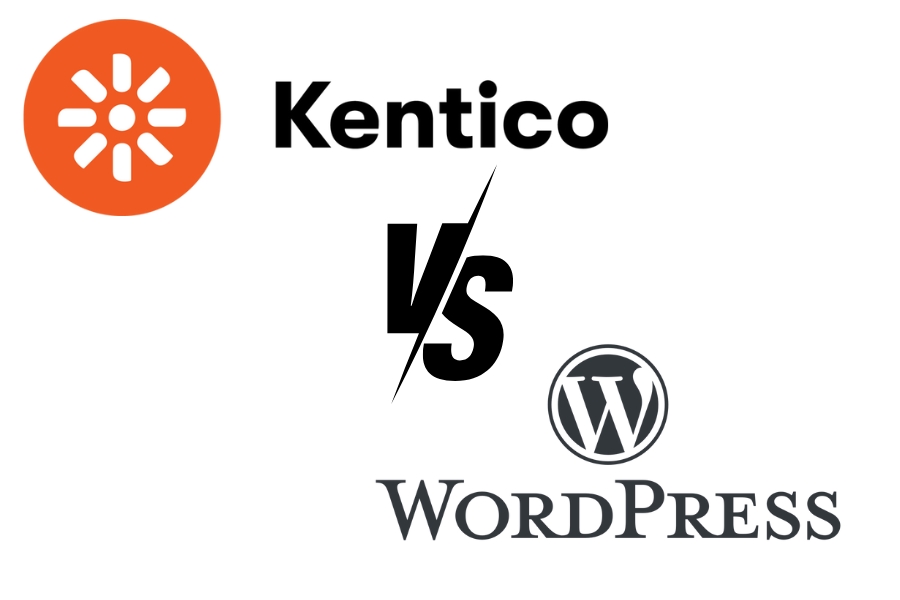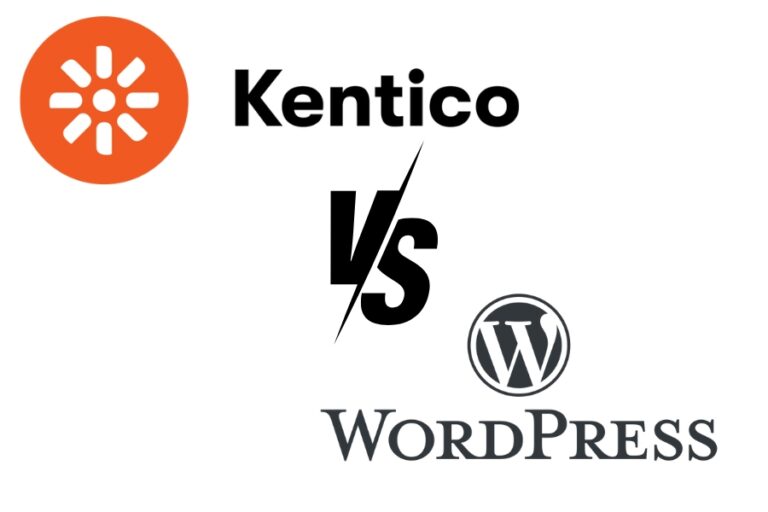As businesses navigate the dynamic landscape of content management systems (CMS), the decision to choose between Kentico CMS and WordPress becomes a critical aspect of establishing and maintaining a robust online presence. In this post, we hope to equip you with a thorough understanding of the features, advantages, and considerations associated with each platform, guiding you towards an informed decision that aligns with their specific needs and aspirations.
/*! elementor – v3.18.0 – 08-12-2023 */
.elementor-widget-image{text-align:center}.elementor-widget-image a{display:inline-block}.elementor-widget-image a img[src$=”.svg”]{width:48px}.elementor-widget-image img{vertical-align:middle;display:inline-block} 
An Overview of the 2 CMS platforms: Kentico and WordPress
WordPress:
Born in 2003 as a simple blogging platform, WordPress has evolved into a CMS juggernaut, powering over 40% of all websites on the internet. Its open-source nature and widespread adoption have made it a go-to choice for individuals, small businesses, and enterprises alike. WordPress’s ecosystem is marked by an extensive library of plugins and themes, fostering a vibrant community and contributing to its status as a versatile and adaptable CMS.
Kentico CMS:
In contrast, Kentico positions itself as a specialised CMS designed explicitly for enterprise-level solutions. Offering a comprehensive suite of features, including web content management, online marketing, ecommerce, and intranet solutions, Kentico is known for its scalability, flexibility, and out-of-the-box functionality. Despite not being open-source like WordPress, Kentico caters specifically to businesses with intricate and complex requirements.
Ease of Use
WordPress:
The hallmark of WordPress lies in its user-friendly interface, providing an intuitive dashboard that allows users of varying technical proficiency to manage and create content effortlessly. The platform’s popularity ensures a wealth of online resources, tutorials, and a vast community for user support. This ease of use extends to content creation, customisation, and management, making WordPress an accessible and efficient choice for businesses of all sizes.
Kentico CMS:
While Kentico offers advanced features and tailored solutions for enterprises, it may present a steeper learning curve compared to WordPress. However, it compensates with a user-friendly interface and a comprehensive set of tools for content editing. Although it may require a moderate level of technical proficiency, Kentico’s advanced features and customisation options can be advantageous for businesses with specific needs.
In terms of ease of use, WordPress stands out for its intuitive design and widespread accessibility. Its user-friendly dashboard simplifies content management, making it an excellent choice for businesses with diverse user bases. Kentico, although catering to enterprise-level needs, may require a slightly higher level of technical proficiency but offers a robust set of tools for content creation and management.
Customisation and Flexibility:
WordPress:
The unparalleled extensibility and customisation capabilities of WordPress make it a standout choice for businesses seeking creative freedom and adaptability. With an extensive library of plugins and themes, users can tailor their websites to specific requirements, creating bespoke solutions. The ability to develop custom themes, plugins, and applications on top of the core system makes WordPress an ideal choice for businesses with diverse needs.
Kentico CMS:
Designed with a focus on extensibility, scalability, and flexibility, Kentico caters to the intricate demands of businesses with complex requirements. It offers a robust API, supports the development of custom modules and widgets, and while it may not boast the sheer volume of third-party plugins available for WordPress, Kentico compensates with a comprehensive set of built-in features. This makes Kentico an excellent choice for businesses seeking a CMS that can be tailored to their unique needs.
Both WordPress and Kentico CMS shine in their ability to accommodate customisation and flexibility, albeit with different approaches. WordPress, with its extensive library of plugins and themes, empowers users to create tailored solutions without extensive coding knowledge. Kentico, on the other hand, provides a robust set of built-in features and support for custom development, making it a suitable choice for businesses with intricate and specific requirements.
Performance and Scalability:
WordPress:
WordPress is renowned for its solid performance, influenced by factors such as the hosting provider, plugins used, and theme efficiency. While larger websites may benefit from performance optimisation and caching, WordPress is capable of scaling to handle significant traffic with careful consideration of hosting and optimisation strategies.
Kentico CMS:
Kentico’s reputation for scalability positions it as an ideal choice for enterprise-level projects. Optimised for performance, Kentico can efficiently handle complex websites with substantial datasets and high traffic volumes. The platform incorporates features like content caching, data indexing, and support for Content Delivery Networks (CDNs) to ensure a responsive user experience even under heavy loads.
Performance and scalability are critical considerations for businesses, especially those anticipating growth in website traffic and content volume. Both WordPress and Kentico CMS demonstrate capabilities in these areas, with WordPress being highly adaptable to various hosting environments and Kentico excelling in handling the demands of enterprise-scale projects.
Security:
WordPress:
Given its popularity, WordPress is a target for security threats. However, the active community and regular updates contribute to addressing vulnerabilities swiftly. Adhering to security best practices and using reputable plugins and themes significantly enhances the platform’s security. Additionally, the availability of security plugins further fortifies WordPress against potential threats.
Kentico CMS:
Kentico places a strong emphasis on security, particularly crucial for businesses handling sensitive data. Regular security audits, a closed-source nature, role-based access control, data encryption, and protection against common web vulnerabilities contribute to a robust security framework. Kentico’s focus on providing a secure environment aligns with the stringent security requirements of enterprises.
Security is a paramount concern for businesses, especially those handling sensitive data or conducting transactions online. Both WordPress and Kentico CMS recognise the importance of security and implement measures to safeguard against potential threats. WordPress’s community-driven approach to security and the availability of numerous security plugins enhance its resilience against vulnerabilities. Kentico, with its enterprise focus, employs a comprehensive security framework to ensure the protection of valuable business data.
Support and Community:
WordPress:
The strength of WordPress lies not only in its features but also in its expansive and active community. Users benefit from extensive documentation, forums, and online resources. The community-driven support ecosystem ensures that businesses can easily find solutions to common issues, and the wealth of tutorials simplifies the learning curve for new users.
Kentico CMS:
Kentico offers a dedicated support team and provides access to official documentation, training materials, and forums. While its community may not match the sheer size of WordPress’s, the support provided is tailored to businesses, with a specific focus on addressing enterprise-level challenges. Kentico’s support infrastructure aligns with the intricate requirements of businesses relying on the platform for mission-critical functions.
Community support is a significant aspect of a CMS, as it enhances the overall user experience and provides a resourceful network for problem-solving. WordPress’s vast and active community ensures that businesses can quickly find solutions to queries, share insights, and stay abreast of the latest developments. Kentico, while not as extensive in terms of community size, compensates with dedicated support tailored to the specific needs of enterprises.
Cost:
WordPress:
One of the compelling aspects of WordPress is its cost-effectiveness. The platform itself is free and open-source, and while businesses may incur costs for hosting, premium themes, and plugins, there is a plethora of free options available. The versatility of WordPress makes it an attractive option for businesses of all sizes, particularly those mindful of budget constraints.
Kentico CMS:
Kentico operates on a commercial model, and its pricing structure depends on factors such as the edition (Kentico EMS for enterprise or Kentico CMS for smaller projects), licensing model, and the specific features required. Larger enterprises with complex requirements may find the investment in Kentico justified by its comprehensive feature set and tailored solutions.
Cost considerations are a significant factor for businesses, especially those looking to maximise their budgetary efficiency. WordPress, being open-source, offers a cost-effective solution for businesses of all sizes. The availability of an extensive library of themes and plugins further adds to its appeal. Kentico, with its commercial model, may involve licensing costs, making it a more substantial investment, particularly for larger enterprises with intricate requirements.
Choosing a CMS for your business
Choosing between Kentico CMS and WordPress for businesses is nuanced and depends on specific needs, goals, and priorities. Both platforms offer distinctive advantages, and the choice should align with the unique characteristics and aspirations of a business.
WordPress emerges as a preeminent choice for businesses seeking versatility, user-friendliness, and a thriving ecosystem. Its user-friendly interface, extensive community support, unparalleled customisation capabilities, and cost-effectiveness make it a robust solution for a diverse range of businesses.
Kentico, with its focus on enterprise-level requirements, scalability, and security, caters to businesses with intricate needs. The platform provides a comprehensive suite of features and a secure environment, making it an optimal choice for enterprises dealing with sensitive data and complex functionalities.
Ultimately, businesses should consider factors such as ease of use, customisation requirements, performance, security, community support, and cost-effectiveness. A nuanced evaluation of these aspects will guide businesses towards the CMS that best aligns with their specific objectives.
In the dynamic landscape of content management systems, the dominance of WordPress continues to be shaped by its adaptability, accessibility, and the robust support it provides to businesses worldwide. As businesses embark on their digital journey, WordPress stands as a reliable and versatile companion, empowering them to navigate the ever-evolving online landscape with agility and innovation.
At Xanthos, we design and build our client’s websites using WordPress as our CMS of choice, after a number of years’ experience in building bespoke websites on Kentico. We design it to suit your business needs and requirements, to ensure it reflects your brand in the best way possible and offers all the functionality you need. Whatever you are looking to get out of your website, we would be thrilled to help. Read more about our WordPress web design services, or contact us with your requirements or schedule a call with a member of our team to find out what we can do to improve your online presence.












